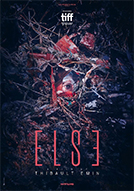Else

| Original title: | Else |
| Director: | Thibault Emin |
| Release: | Vod |
| Running time: | 100 minutes |
| Release date: | Not communicated |
| Rating: |
Mulder's Review
Thibault Emin's debut feature Else is a bold, if uneven, exploration of the limits of individuality, intimacy and humanity itself, wrapped in a surreal, haunting body horror. Premiering at the Toronto International Film Festival (TIFF), the film presents a fascinating concept: a world where people literally melt into their surroundings, transforming intimacy into a volatile, grotesque proposition. While Else's ambition is undeniable, its execution stumbles under the weight of its own ideas, resulting in a film as fascinating as it is frustrating.
At the heart of Else is Anx, played by Matthieu Sampeur, whose performance captures a profound sense of unease and fragility. Anx is socially awkward, a man-child whose apartment - a gaudy, kaleidoscopic space filled with toys and bright colors - reflects his emotional immaturity. His unexpected bond with Cass, played by Édith Proust, forms the backbone of the film. Cass is the opposite of Anx: loud, brash and unequivocally free-spirited. Their unlikely romance begins with awkward intimacy and turns to chaos as the outside world succumbs to an apocalyptic pandemic.
The pandemic highlighted in Else is no ordinary virus; it turns people into elements of their environment, merging them with furniture, sidewalks or even other people. This grotesque premise is brilliantly realized with practical effects and inventive sound design, giving the horror a tactile, visceral quality. Léo Lefèvre's cinematography alternates between vivid, home-video-like hues and austere black-and-white images, amplifying the film's tonal shifts. The result is a visual experience that oscillates between dreamy intimacy and nightmarish alienation.
However, while the technical work is commendable, the narrative leaves something to be desired. Anx and Cass, as central characters, remain frustratingly underdeveloped. Cass, in particular, is presented as a caricature rather than an individual in her own right, which detracts from the emotional stakes of their relationship. As their apartment becomes both a refuge and a prison, the psychological depth of their confinement is suggested but never fully explored. The film attempts to tackle weighty themes of isolation, connection and fragile identity, but
these ideas are often lost in genre confusion and inconsistent tone.
The film's pacing, too, is a double-edged sword. While the gradual build-up of tension reflects the slow advance of the pandemic, it also risks losing the audience's commitment. Moments of body horror, while visually striking, lack the necessary visceral impact. The grotesque transformations are more cerebral than terrifying, which may leave genre fans looking for more immediate sensations.
Thibault Emin's decision to structure Else around a traditional three-act framework also limits the film's potential. Given the fluidity of time and space suggested by the effects of the pandemic, a more experimental, non-linear approach might have better served the story's themes and enhanced its emotional resonance. The existential dread that permeates the narrative seems limited by the film's adherence to conventional storytelling techniques.
Despite its shortcomings, Else is undeniably ambitious. Thibault Emin's vision is one of bold creativity, and the film's thematic ambition - to address questions of intimacy, individuality and humanity in the face of a dehumanizing crisis - is commendable. The film's central metaphor, while not entirely original, is hauntingly relevant in a world still grappling with the psychological scars of a global pandemic. Its ability to make audiences reflect on their own fears of isolation and connection is perhaps its greatest strength.
Else is a film that sticks in the mind, if not for its narrative coherence, at least for its striking images and provocative ideas. Thibault Emin may not succeed in fusing romance, horror and science fiction into a coherent whole, but his debut feature establishes him as a filmmaker with a bold and distinctive voice. For those willing to accept its shortcomings, Else offers a challenging and thought-provoking cinematic experience - an unsettling reflection on what it means to be “one” with another.
Else
Directed by Thibault Emin
Produced by Damien Lagogué
Written by Thibault Emin, Alice Butaud, Emma Sandona
Starring : Matthieu Sampeur, Edith Proust, Lika Minamoto
Music by Shida Shahabi
Cinematography : Léo Lefèvre
Edited by Ariane Boukerche
Production companies: Wrong Men, Les Produits Frais Rouge International, Tobina Film
Distributed by UFO Distribution (France), WTFilms International (United States)
Release date : NC
Running time : 100 minutes
Viewed on September 30, 2024 (Fantastic Fest press screener)
Mulder's Mark:

